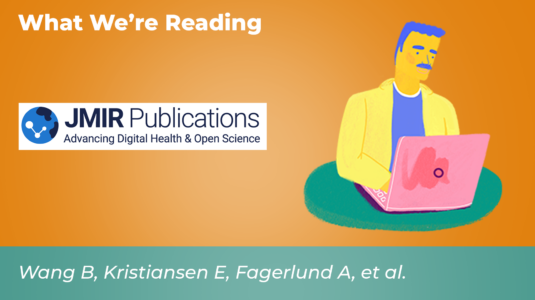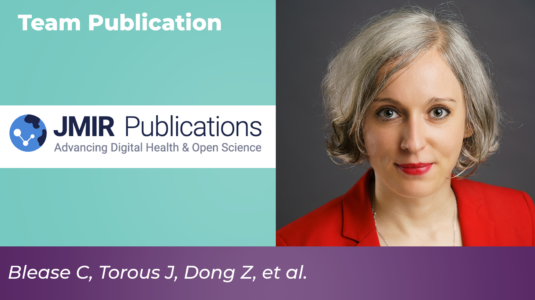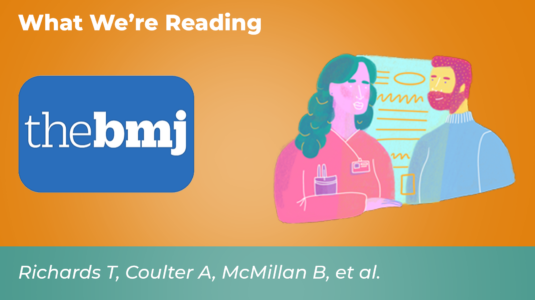[…] This study aimed to provide insight into the impact of PAEHR [patient-accessible electronic health records] on patient care, particularly for those with mental health conditions, and to inform clinical strategies to improve the use of PAEHR in health care settings. The transition toward EHR accessibility may present health care professionals with a unique opportunity to change how they think and write about patients.
Hägglund, Maria
Patient online record access in English primary care: Qualitative survey study of general practitioners’ views
This study provides timely information on the views of GPs in England regarding patient access to their web-based health records. Overwhelmingly, GPs were skeptical about the benefits of access both for patients and to their practices.
Patient access to full general practice health records
Researchers in the UK say patients have little choice but to be more self-reliant due to overwhelming demands on the health system. Ready online access to full health records could help and may also reduce demand.
Sharing Clinical Notes and Electronic Health Records With People Affected by Mental Health Conditions: Scoping Review
PAEHRs in MHC may strengthen user involvement, patients’ autonomy, and shift medical treatment to a coproduced process. Acceptance issues among health care professionals align with the findings from general health settings. However, the corpus of evidence on digital sharing of EHRs with people affected by mental health conditions is limited. Above all, further research is needed to examine the clinical effectiveness, efficiency, and implementation of this sociotechnical intervention.
The benefits and harms of open notes in mental health: A Delphi survey of international experts
This survey used a Delphi poll – an established methodology used to investigate emerging healthcare policy, including in psychiatry. International experts who included health professionals and persons with lived experience of mental healthcare were asked to give their opinions, anonymously, in three rounds of online surveys, and to offer their views about the potential benefits and harms of online access to mental health notes. Experts – drawn from 70 experts from six countries – agreed patients’ access to their mental health notes could offer multiple benefits and few harms.
Patients, clinicians and open notes: information blocking as a case of epistemic injustice
We address the contrasting perceptions of this practice innovation, and claim that the divergent views of patients and clinicians can be explained as a case of epistemic injustice. Using a range of evidence, we argue that patients are vulnerable to (oftentimes, non-intentional) epistemic injustice. Nonetheless, we conclude that the marginalisation of patients’ access to their health information exemplifies a form of epistemic exclusion, one with practical and ethical consequences including for patient safety.
Knowledge, power, and patients: The ethics of open notes
But do patients really need access to their health information, or should electronic health records be the sole preserve of physicians? We explore this question using our own case studies.
Open Notes Become Law: A Challenge for Mental Health Practice
Although benefits to patients’ having access to psychiatric notes have been documented, early studies involved patients’ access to hard copies they often reviewed in the presence of mental health professionals. … Clinicians worry about possible harms, and in surveys, many psychiatrists anticipate that patients will become confused, get angry, or decompensate when reading their notes. However, experience challenges the assumption that mental health notes should remain segregated because these patients “cannot handle it.” … Both anecdotally and in surveys, fears among clinicians have largely been unrealized, and we are not aware of any reports of harm to or legal action from patients accessing their mental health notes.
Preparing Patients and Clinicians for Open Notes in Mental Health: Qualitative Inquiry of International Experts
This study provides timely information on policy and training recommendations derived from a wide range of international experts on how to prepare clinicians and patients for open notes in mental health. The results of this study point to the need for further refinement of exemption policies in relation to sharing mental health notes, guidance for patients, and curricular changes for students and clinicians as well as improvements aimed at enhancing patient and clinician-friendly portal design.
Patient Access to Mental Health Notes: Motivating Evidence-Informed Ethical Guidelines
In the last decade, many health organizations have embarked on a revolution in clinical communication. Using electronic devices, patients can now gain rapid access to their online clinical records. Legally, patients in many countries already have the right to obtain copies of their health records; however, the practice known as “open notes” is different. Via secure online health portals, patients are now able to access their test results, lists of medications, and the very words that clinicians write about them. Open notes are growing with most patients in the Nordic countries already offered access to their full electronic record. From April 2021, a new federal ruling in the United States mandates—with few exemptions—that providers offer patients access to their online notes.






